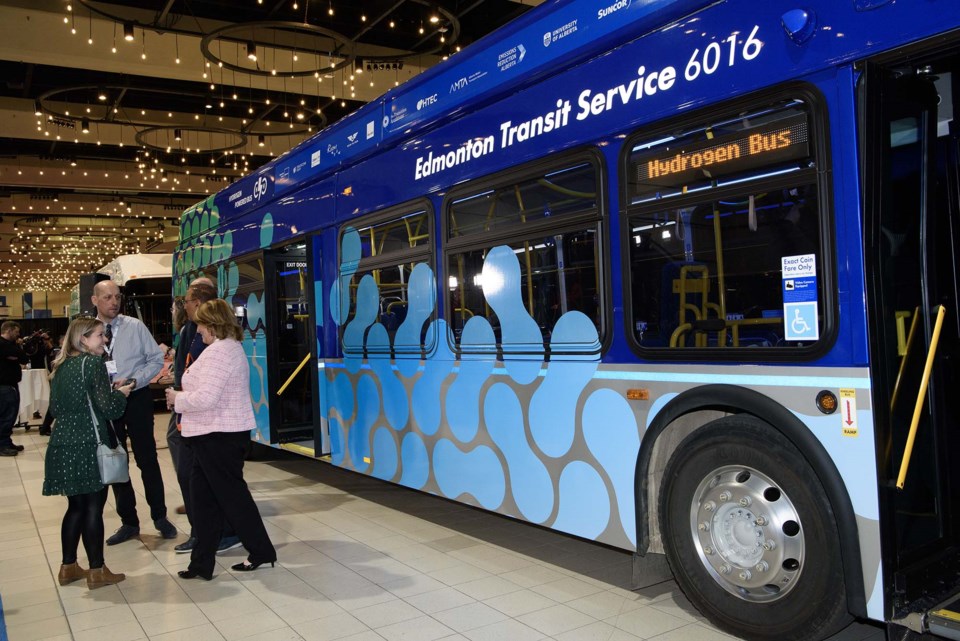Hydrogen could help Alberta’s trucks and buses drive into a carbon-free future, say advocates at a recent conference.
About 8,000 people were at the Edmonton Convention Centre April 25 to 27 for the second annual Canadian Hydrogen Convention.
Many checked out a showcase of hydrogen-powered cars, trucks, and buses assembled for the convention, where experts shared their thoughts on how hydrogen could power the future of transportation.
H2 solutions
Road transportation was the second biggest source of greenhouse gas emissions in Canada in 2021 after harvested wood products, reports Environment and Climate Change Canada. Heavy-duty diesel vehicles account for 30 per cent of road transportation emissions and have grown 124 per cent since 1990.
The seven vehicles on display at the conference demonstrated how hydrogen (which can be a zero-carbon energy source if produced properly) could help shrink the carbon footprint of big trucks and buses.
David Richards of Diversified Transportation showed off a bus his company had retrofitted to run on an 80/20 hydrogen/diesel mix. The bus is scheduled to start touring Alberta this July.
“There’s a lot of capital sunk into fleets,” Richards said, and most buses last about 20 years.
A hydrogen-powered luxury coach bus will likely cost twice as much as a diesel one should one ever hit the market, Richards said. This retrofit costs just $50,000 per bus, and will let Diversified get more use out of its current fleet while reducing maintenance costs and cutting greenhouse gas emissions by 40 to 80 per cent.
Cory Shumaker of Hyzon Motors brought a big blue semi-truck powered by hydrogen fuel cells to the conference. The truck was one of several being tested on Alberta roads through the Alberta Motor Transportation Association.
Shumaker said hydrogen-powered trucks have more range and hauling capacity than battery-powered ones because the fuel cells weigh less.
“From a tailpipe (perspective), it completely eliminates all greenhouse gases and all particulate pollutants,” he said of the fuel cells.
“You can run (this truck) in your living room.”
Strathcona County transportation director Wade Coombs discussed the two hydrogen fuel cell buses that will be hitting the streets in Strathcona and Edmonton this summer.
Battery electric buses lose about half their range in the winter and require many dedicated charging stations, Coombs said. Strathcona County’s initial tests suggest that a hydrogen-powered bus has about the same range as a diesel one in -23 C conditions, and that a whole fleet of them could be powered by a single hydrogen fuel station.
“The question is, is hydrogen better than electric?” Coombs said.
Coombs said this region was well positioned to switch to hydrogen should it prove to be a viable alternative, as it was next to the hydrogen-rich Alberta’s Industrial Heartland. Hydrogen vehicles could both support local industry and reduce greenhouse gas emissions.
H2 problems
Hydrogen-powered vehicles have a lot of roadblocks between them and the road, conference-goers heard. Hydrogen is expensive — up to $60 a kilogram, said Eddie Robar, branch manager of fleet and facilities services with the City of Edmonton — and so are hydrogen vehicles, with hydrogen buses costing about twice as much as diesel ones. It’s also challenging to refuel hydrogen vehicles, as Alberta doesn’t have any hydrogen fuel stations.
Coombs said Suncor was now building the first such station in Alberta. Edmonton Mayor Amarjeet Sohi announced at the conference that Edmonton would build a hydrogen station its Centennial Garage in about two years to service city buses and private vehicles.
Conference speaker Samantha Irwin of Exergy Solutions said hydrogen prices will have to fall significantly before hydrogen catches on as a solution for heavy trucks. Diesel-hydrogen retrofits could act as an interim step, reducing emissions while also driving up demand for hydrogen.
“It’s an easy step for companies to take,” she said.




